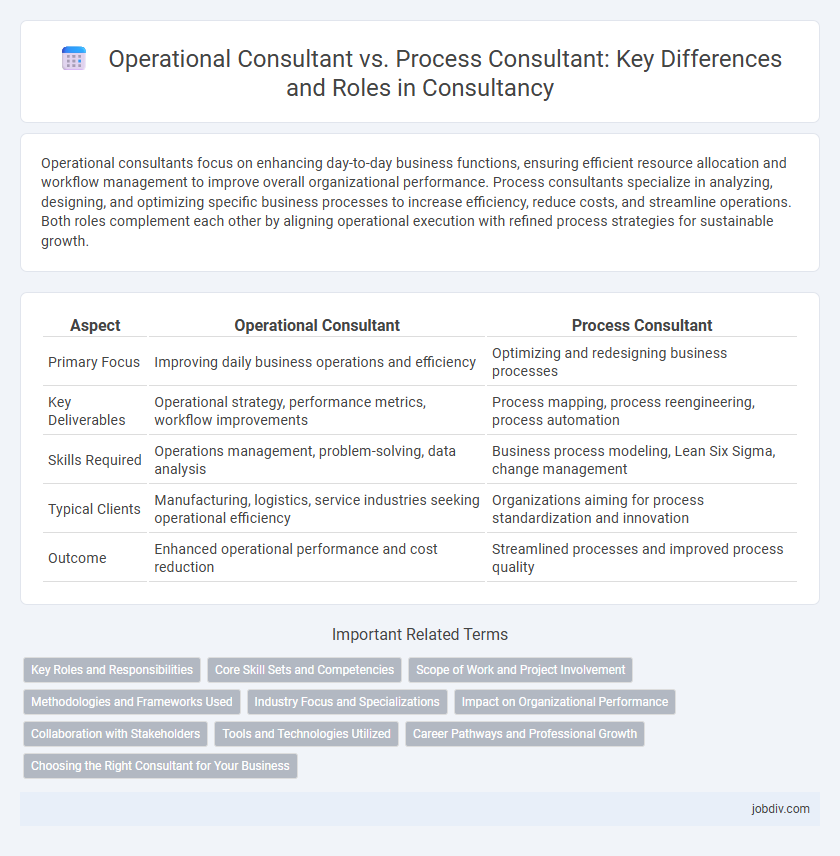Operational consultants focus on enhancing day-to-day business functions, ensuring efficient resource allocation and workflow management to improve overall organizational performance. Process consultants specialize in analyzing, designing, and optimizing specific business processes to increase efficiency, reduce costs, and streamline operations. Both roles complement each other by aligning operational execution with refined process strategies for sustainable growth.
Table of Comparison
| Aspect | Operational Consultant | Process Consultant |
|---|---|---|
| Primary Focus | Improving daily business operations and efficiency | Optimizing and redesigning business processes |
| Key Deliverables | Operational strategy, performance metrics, workflow improvements | Process mapping, process reengineering, process automation |
| Skills Required | Operations management, problem-solving, data analysis | Business process modeling, Lean Six Sigma, change management |
| Typical Clients | Manufacturing, logistics, service industries seeking operational efficiency | Organizations aiming for process standardization and innovation |
| Outcome | Enhanced operational performance and cost reduction | Streamlined processes and improved process quality |
Key Roles and Responsibilities
Operational consultants focus on improving overall business performance by analyzing and optimizing organizational processes, resource allocation, and operational workflows to enhance efficiency and reduce costs. Process consultants specialize in mapping, evaluating, and redesigning specific business processes to ensure consistency, compliance, and continuous improvement within departments or cross-functional teams. Both roles require strong analytical skills, stakeholder engagement, and change management expertise to drive sustainable operational excellence.
Core Skill Sets and Competencies
Operational Consultants specialize in optimizing daily business functions through expertise in workflow analysis, resource allocation, and performance metrics to enhance efficiency and reduce costs. Process Consultants focus on designing, modeling, and improving end-to-end business processes using methodologies such as Six Sigma and Lean to drive systematic improvement and quality control. Core skills for Operational Consultants include strategic planning, data interpretation, and operational management, while Process Consultants excel in process mapping, change management, and continuous improvement techniques.
Scope of Work and Project Involvement
An Operational Consultant focuses on optimizing day-to-day business functions, including resource allocation, performance management, and operational efficiency across departments. A Process Consultant specializes in analyzing, designing, and improving specific workflows or business processes to increase effectiveness and reduce bottlenecks. Project involvement for Operational Consultants often spans broad organizational initiatives, while Process Consultants engage deeply with targeted process reengineering efforts to support strategic goals.
Methodologies and Frameworks Used
Operational consultants primarily utilize methodologies such as Lean Six Sigma, Kaizen, and Total Quality Management (TQM) to improve efficiency and reduce operational costs. Process consultants focus on process modeling frameworks like BPMN (Business Process Model and Notation), SCOR (Supply Chain Operations Reference), and DMAIC (Define, Measure, Analyze, Improve, Control) to optimize workflows and enhance process performance. Both roles employ data-driven analysis tools and continuous improvement frameworks but target different aspects of organizational effectiveness.
Industry Focus and Specializations
Operational consultants specialize in optimizing day-to-day business functions across various industries such as manufacturing, logistics, and retail, leveraging expertise in operational efficiency, resource allocation, and performance measurement. Process consultants concentrate on the design and improvement of business processes, often focusing on sectors like finance, healthcare, and IT, with deep knowledge of workflow analysis, process mapping, and automation technologies. Both roles require a strong understanding of industry-specific regulations and standards to tailor solutions that enhance productivity and compliance.
Impact on Organizational Performance
Operational consultants focus on enhancing day-to-day business functions by optimizing resource allocation, workflow efficiency, and cost management, directly impacting organizational performance through improved productivity and reduced operational risks. Process consultants analyze and redesign business processes to streamline activities, eliminate redundancies, and enhance quality control, which increases organizational agility and customer satisfaction. The combined influence of operational and process consulting drives sustainable growth by aligning strategic goals with efficient execution and continuous improvement.
Collaboration with Stakeholders
Operational Consultants collaborate closely with stakeholders to analyze day-to-day business functions, ensuring efficiency and seamless execution of tasks aligned with organizational goals. Process Consultants engage with stakeholders to map, redesign, and optimize workflows, driving improvements in process effectiveness and reducing bottlenecks. Both roles prioritize stakeholder communication but focus on different levels of operational improvement for enhanced organizational performance.
Tools and Technologies Utilized
Operational consultants leverage advanced data analytics platforms and enterprise resource planning (ERP) systems to optimize organizational workflows and enhance performance metrics. Process consultants utilize process mapping software, workflow automation tools, and business process management (BPM) suites to streamline and redesign existing procedures. Both roles depend on collaboration platforms and real-time reporting dashboards to ensure data-driven decision-making and continuous improvement strategies.
Career Pathways and Professional Growth
Operational Consultants specialize in optimizing daily business functions, often advancing towards roles like Operations Manager or Director of Operations by honing expertise in supply chain management, logistics, and performance metrics. Process Consultants focus on analyzing and improving business processes, with career trajectories leading to positions such as Business Process Manager or Continuous Improvement Leader, leveraging skills in Six Sigma, Lean methodologies, and workflow automation. Both pathways offer significant opportunities for professional growth, but Operational Consultants tend to develop broader management responsibilities, while Process Consultants deepen analytical and improvement methodologies expertise.
Choosing the Right Consultant for Your Business
Choosing the right consultant depends on your business needs: an Operational Consultant focuses on improving day-to-day business functions and efficiency, while a Process Consultant specializes in analyzing and redesigning workflows for long-term process optimization. Operational Consultants deliver targeted solutions to enhance current operations, often addressing immediate challenges in areas like supply chain, production, or service delivery. Process Consultants provide strategic insights to restructure processes, increase productivity, and ensure sustainable growth through continuous improvement methodologies such as Lean and Six Sigma.
Operational Consultant vs Process Consultant Infographic

 jobdiv.com
jobdiv.com